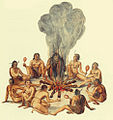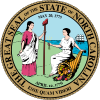Portal:North Carolina
The North Carolina PortalA view of Harris Lake from the Harris Lake County Park in Wake County, North Carolina, with the Shearon Harris Nuclear Power Plant in view (2021)
 North Carolina (/ˌkærəˈlaɪnə/ ⓘ KARR-ə-LIE-nə) is a state in the Southeastern region of the United States. It is bordered by Virginia to the north, the Atlantic Ocean to the east, South Carolina to the south, Georgia to the southwest, and Tennessee to the west. The state is the 28th-largest and 9th-most populous of the United States. Along with South Carolina, it makes up the Carolinas region of the East Coast. At the 2020 census, the state had a population of 10,439,388. Raleigh is the state's capital and Charlotte is its most populous city. The Charlotte metropolitan area, with an estimated population of 2,805,115 in 2023, is the most populous metropolitan area in North Carolina, the 22nd-most populous in the United States, and the largest banking center in the nation after New York City. The Research Triangle, with an estimated population of 2,368,947 in 2023, is the second-most populous combined metropolitan area in the state, 31st-most populous in the United States, and is home to the largest research park in the United States, Research Triangle Park. The earliest evidence of human occupation in North Carolina dates back 10,000 years, found at the Hardaway Site. North Carolina was inhabited by Carolina Algonquian, Iroquoian, and Siouan speaking tribes of Native Americans prior to the arrival of Europeans. King Charles II granted eight lord proprietors a colony they named Carolina after the king and which was established in 1670 with the first permanent settlement at Charles Town (Charleston). Because of the difficulty of governing the entire colony from Charles Town, the colony was eventually divided and North Carolina was established as a royal colony in 1729 and was one of the Thirteen Colonies. The Halifax Resolves resolution adopted by North Carolina on April 12, 1776, was the first formal call for independence from Great Britain among the American Colonies during the American Revolution. On November 21, 1789, North Carolina became the 12th state to ratify the United States Constitution. In the run-up to the American Civil War, North Carolina declared its secession from the Union on May 20, 1861, becoming the tenth of eleven states to join the Confederate States of America. Following the Civil War, the state was restored to the Union on July 4, 1868. On December 17, 1903, Orville and Wilbur Wright successfully piloted the world's first controlled, sustained flight of a powered, heavier-than-air aircraft at Kitty Hawk in North Carolina's Outer Banks. North Carolina often uses the slogan "First in Flight" on state license plates to commemorate this achievement, alongside a newer alternative design bearing the slogan "First in Freedom" in reference to the Mecklenburg Declaration and Halifax Resolves. (Full article...) Entries here consist of Good and Featured articles, which meet a core set of high editorial standards.
The effects of Hurricane Isabel in North Carolina were widespread, with the heaviest damage in Dare County. The hurricane made landfall in the Outer Banks of North Carolina on September 18. There, storm surge flooding and strong winds damaged thousands of houses. The storm surge produced a 2,000 feet (610 m) wide inlet on Hatteras Island, isolating Hatteras by road for two months. Several locations along North Carolina Highway 12 were partially washed out or covered with debris. Hurricane Isabel produced hurricane-force wind gusts across eastern North Carolina, knocking down trees and power lines. About 700,000 residents lost power due to the storm, although most outages were restored within a few days. The hurricane killed three people in the state – two due to falling trees, and the other a utility worker attempting to restore electricity. Damage in the state totaled $450 million (2003 USD, $745 million 2024 USD). The National Hurricane Center issued a hurricane watch, and later warning, for the state's coastline in advance of the hurricane's landfall. Local officials issued evacuation orders for 18 counties, along with various flood warnings. In the aftermath of the hurricane, then-President George W. Bush declared a state of emergency for 26 counties in the state, which allocated federal resources to the state. Utility crews from nearby states helped restore power. The United States Geological Survey dredged sand to restore the breach on Hatteras Island, with traffic restored about two months after the hurricane. (Full article...)Selected article -The governor of North Carolina is the head of government of the U.S. state of North Carolina and commander-in-chief of the state's military forces. There have been 69 governors of North Carolina, with six serving non-consecutive terms, totaling 75 terms. The current governor is Democrat Roy Cooper, who took office on January 1, 2017. (Full article...)General images -The following are images from various North Carolina-related articles on Wikipedia.
Did you know -
TopicsCategoriesNew articlesThis list was generated from these rules. Questions and feedback are always welcome! The search is being run daily with the most recent ~14 days of results. Note: Some articles may not be relevant to this project.
Rules | Match log | Results page (for watching) | Last updated: 2024-04-28 21:22 (UTC) Note: The list display can now be customized by each user. See List display personalization for details.
Related portalsWikiProjectsAssociated WikimediaThe following Wikimedia Foundation sister projects provide more on this subject:
Sources |
- Pages using the Phonos extension
- Manually maintained portals without listed maintainers
- Manually maintained portal pages from August 2021
- All manually maintained portal pages
- Single-page portals
- All portals
- Portals with no named maintainer
- Pages including recorded pronunciations
- Portals needing attention
- United States portals by state or territory
- WikiProject North Carolina
- North Carolina
- Portals needing placement of incoming links

































